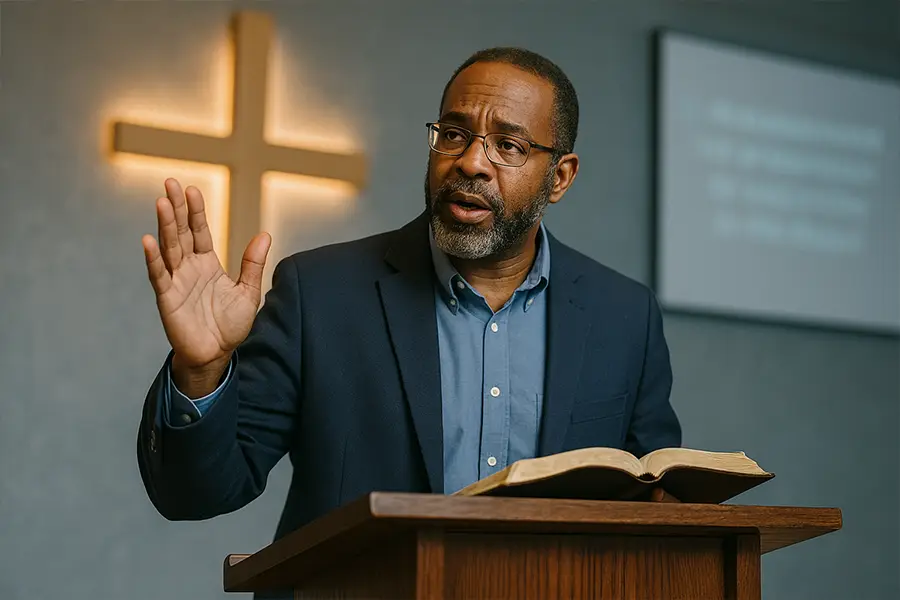Pastoring a church is about more than delivering powerful sermons; it’s about leading a community of faith toward spiritual and organizational growth. In today’s world, a thriving church depends not only on sound theology but also on strong leadership. Pastors are often expected to wear many hats: shepherd, counselor, strategist, and administrator. To meet these expectations and help their ministries flourish, pastors need a well-rounded set of leadership skills.
We highlight ten essential leadership skills that every pastor should cultivate to grow a healthy, thriving church.
1. Vision Casting
A pastor with vision can inspire a congregation to move forward in unity. Vision casting involves articulating a clear, compelling direction for the church’s future, one rooted in faith and mission. When communicated effectively, this vision energizes both staff and members, giving purpose to ministries and decisions.
“Where there is no vision, the people perish.” – Proverbs 29:18
2. Effective Communication
Whether from the pulpit, in staff meetings, or during one-on-one counseling, a pastor’s ability to communicate clearly is foundational. Great leaders adapt their message to fit the audience and the medium—be it in person, via email, or through social media. Strong communication also builds trust, fosters transparency, and resolves misunderstandings.
3. Team Building and Delegation
One of the key differences between a growing church and a stagnant one is how well the pastor builds and empowers teams. Delegating responsibilities not only prevents burnout but also creates space for others to use their spiritual gifts. Strong leadership isn’t about doing everything—it’s about equipping others to lead well.

4. Conflict Resolution
Disagreements are inevitable in any community. What matters is how a pastor navigates them. Conflict resolution requires wisdom, patience, and discernment. By addressing tension promptly and biblically, a pastor can restore relationships and preserve unity within the church.
5. Strategic Planning
A thriving church doesn’t grow by accident. Strategic planning involves setting goals, evaluating resources, and aligning ministries with the church’s mission. Whether it’s launching a new program, hiring staff, or planning a building expansion, pastors must think long-term and lead with clarity.
6. Financial Stewardship
Pastors often play a key role in overseeing the church’s financial health. From understanding budgets to teaching biblical stewardship, effective leaders help their congregations manage resources wisely. Transparent financial practices build credibility and trust among church members and potential donors.
7. Emotional Intelligence
Emotional intelligence (EQ) enables pastors to lead with empathy, self-awareness, and resilience. It helps in understanding the emotional needs of others and responding appropriately. A high EQ builds stronger relationships, improves communication, and fosters a safe space for vulnerability.
8. Adaptability
The ability to pivot in times of uncertainty—like during a global pandemic—is essential. Churches that embraced online services, digital giving, and virtual discipleship thrived because of adaptable leadership. Flexibility allows pastors to meet new challenges with creativity and courage.
9. Discipleship and Mentorship
Great leaders don’t just lead—they raise up new leaders. Pastors who invest in mentoring others multiply their impact and prepare the church for future growth. Discipleship goes beyond Sunday sermons; it’s about walking alongside others in their spiritual journey.
Explore Mentorship Models in Ministry (The Navigators)
10. Community Engagement
A church thrives when it’s engaged with the community around it. Whether through outreach events, partnerships with local nonprofits, or participation in civic matters, pastors should lead the way in showing the love of Christ beyond the church walls.

FAQs
1. Can pastors develop these leadership skills, or are they innate?
Most leadership skills can be developed with intentional practice, mentorship, and continued learning.
2. How can small church pastors implement these skills with limited resources?
Start by focusing on two or three areas and building strong volunteer teams. Small steps lead to big impact.
3. Is leadership more important than theology in pastoral ministry?
Both are essential. Theology guides what you believe, while leadership shapes how you apply those beliefs within a congregation.
4. What are the best resources for pastors to grow as leaders?
Books, podcasts, coaching, and leadership training conferences are great tools. Online platforms like ChurchLeaders offer practical advice.
5. How can pastors measure their leadership effectiveness?
Feedback from trusted peers, staff retention, member engagement, and spiritual growth indicators are all useful metrics.
Conclusion
Leadership is not a title—it’s a responsibility. By cultivating these ten essential skills, pastors can guide their churches with confidence, compassion, and purpose. A thriving church doesn’t depend solely on attendance or budget—it flourishes under the care of a shepherd who leads well.
At Iglesias Loans, we’re committed to empowering pastors and churches with the financial resources they need to expand, renovate, or grow their ministries. Whether you’re considering refinancing or planning for your church’s next chapter, we’re here to help you lead with strength. Contact us!


